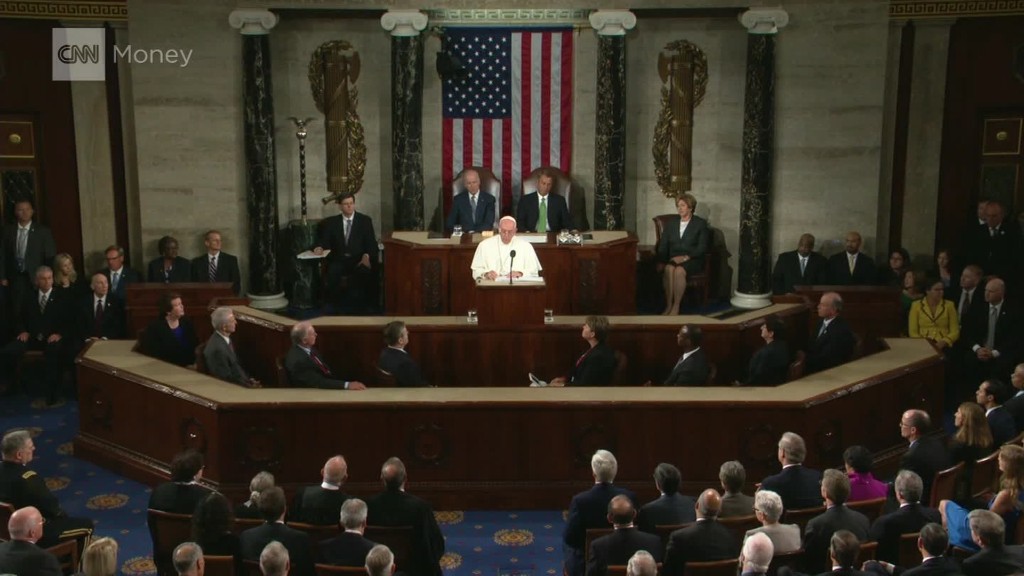
Lawrence Gutman is a Fellow at the World Policy Institute, where he is developing the Cuban Reset project. He tweets @lawrencegutman.
As Pope Francis prepares to address a joint session of Congress, the U.N. General Assembly, and Catholics in Washington, New York and Philadelphia, the first stage of an historic reconciliation between the U.S. and Cuba is drawing to a close.
After a half-century of hostility and months of negotiations brokered by the pontiff himself, U.S.-Cuban diplomacy is restored and the horizon of bilateral trade is within sight.
Expectations that Pope Francis would avoid discussing U.S.-Cuban relations dissipated upon his arrival in Havana.
Standing on the airport tarmac, the first Latin American pontiff praised, "an event which fills us with hope: the process of normalizing relations between two peoples following years of estrangement."
Related: Cuba opens U.S. bank account
During a meeting with Fidel Castro, he handed the former Cuban leader the writings of Fr. Armando Llorente, a priest who fled the island in exile. The papal message is clear: the diplomatic hurdles are behind us, and now the real work of reconciliation begins.
For the Obama Administration, that work will focus on dismantling the 54 year-old trade embargo. The day before Pope Francis landed in Havana, the U.S. removed limits on remittances, and permitted citizens to open Cuban bank accounts, businesses to open Cuban offices, and U.S. telecom firms to offer roaming services.
The easing of restrictions will deepen economic ties that 95% of Cubans view as beneficial. Since the first round of relaxed sanctions in January, U.S. tourism to Cuba has increased by roughly 40%. Congressional delegations to Havana began in February, and trade missions organized by U.S. officials and representatives from JetBlue, Pfizer, and MasterCard followed shortly thereafter.
Related: Businesses tell Marco Rubio: Change your Cuba stance
In May, the U.S. withdrew Cuba from its list of state sponsors of terror and, in doing so, granted Cuba access to international financial transactions. Companies operating or scheduled to begin operating on the island include Netflix, Airbnb, and Carnival Cruise Lines. Cargill, Procter & Gamble, Caterpillar, Shell Oil, and Chevron, among others, are lobbying Capitol Hill for normalized trade.
Yet U.S.-based firms will not be Cuba's only future trading partners. In July, Marriott CEO Arne Sorenson observed that, "steps taken by President Obama ... have launched a bit of a global race involving business from other countries to leave as little as possible for American business when the restrictions are lifted altogether."
Indeed, rising anxiety among U.S. investors over crowded Cuban markets follows the development of projects like the Mariel Free Trade Zone, a $1 billion port and container terminal that received over $680 million from Brazil. China is active in Cuban tourism, mining, and energy, and is Cuba's largest creditor and second largest trading partner (behind Venezuela). A consortium of British firms is investing $400 million in tourism, agriculture, infrastructure, and energy. In May, French President François Hollande met with Raúl Castro to discuss expanded European-Cuban trade.
Related: Airbnb opens for business in Cuba
The scope of Cuba's current partnerships suggest that trade alone will not drive political change.
Few observers expect Havana to enact substantial democratic reform in the near term. Dissidents were detained prior to and during the papal visit, and they will continue to be detained. According to a recent poll, only 20% of Cubans are comfortable expressing their political views in public. Cuba remains a one-party state with an adaptable and hardened bureaucracy.
Yet it is difficult to imagine that reform will be undermined by the changes enacted by the White House and supported by the Vatican.
In fact, some change is already afoot. Independent journalists work with greater freedom than ever before under the Revolution. Access to broadband and social media is slowly expanding. A nascent private sector is growing and public-sector employment is shrinking.
The hostilities of the Cold War are disintegrating and political repression will prove increasingly taxing for Havana moving forward. Cuba and the U.S. may emerge from the ongoing reconciliation process among the most integrated countries in the Americas.


